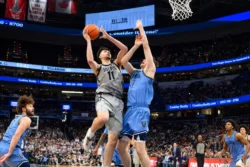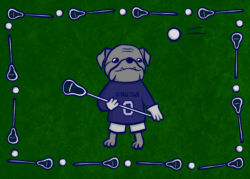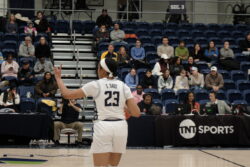Senior Tyler Adams, at a height of 6-foot-9 and a weight of 250 pounds, is hard to miss. He’s a member of the Georgetown men’s basketball team, but you won’t ever see him in uniform during the games. You won’t see him playing at practice, either. Instead, you’ll find him reviewing the team’s film, giving the players advice, and cheering them on from the bench during games.
After discovering a possibly fatal heart condition in Dec. 2011, Adams decided to give up playing basketball and has now become an assistant coach of sorts for the team, doing whatever he can to help out.
Before realizing he could no longer play basketball, Adams came to Georgetown poised to make an impact on the team when he enrolled on the Hilltop in the fall of 2011.
“Coach Thompson and my assistant coach Robert Kirby had told me to come prepared to work and be ready to play early as a freshman,” Adams said of his expectations his first year. “Everybody thinks they can go to the NBA, so I mean that was one of my main goals when I got here. I mean even if I wasn’t good enough to get to the NBA, I thought I would at least get a shot to play overseas for a good team.”
Adams had been the captain of his high school basketball team his junior and senior years. During his first fall at Georgetown, he played four games with an average of 2.5 points per game. In early December, however, he experienced chest pain during practice. Adams had testing done on his heart after experiencing the pain and was not diagnosed with a specific disorder.
“My heart rate wasn’t going up as high as it needed to be, and the doctor said I could play for 20 years and nothing happens or I could play for two minutes and something could happen,” Adams told the Voice.
This problem did not come as a surprise to Adams. He was born with an irregular heartbeat, and at the age of six had to have a muscle removed from his heart. He said after that surgery until the age of 18, he had no problems with his heart and had no trouble playing in high school.
The summer before coming to Georgetown, however, Adams did stress tests and his heart rate did not go as high as it needed to. After this, he began to use a pacemaker, but the problem didn’t go away, as he experienced difficulties that prevented him from playing for good.
Adams said that at first, it was stressful to know that he could no longer play basketball.
“I pretty much came to Georgetown to play basketball. All the academics are important too, but that was one of my main focuses for why I was coming here,” he told the Voice. “It was kind of stressful at first, but I’m not really a person who mourns or gets sad about things, because in life bad things happen to people everyday so I couldn’t, even though its a big issue, I couldn’t let one problem dictate how I live the rest of my life.”
Adams initially considered transferring to a smaller school closer to his hometown of Brandon, Miss., but Coach Thompson said he could stay on the team and keep his scholarship. Since then, Adams has become a manager for the team and acts like another coach.
“He has his heart issues and that’s hard. That’s hard,” Coach Thompson told the Voice. “For someone who basketball has meant so much to, that’s hard on him, and that’s hard on us. But I call him my junior coach. He stays engaged. He’s here everyday. He understands what we’re doing.”
Adams says Coach Thompson makes him feel like he is still very much a part of the team. He still attends every workout, practice, and game. He does whatever he can to help his teammates, whether that entails watching film or wiping floors. And the players appreciate it.
Senior guard Jabril Trawick says Adams is a leader and a sort-of second coach. Adams doesn’t protest to this description. “With [senior forward] Mikael [Hopkins], we hang out a lot so I’m always giving him pointers, even when we’re outside the gym, which probably annoys him a bit.”
In the future, Adams said he might like to go into coaching. “I mean growing up I’ve always wanted to be a coach,” he told the Voice. “I always said if I couldn’t play basketball, I would definitely want to go into coaching. So that’s probably why it’s a lot easier for me to deal with this, too. It’s something that I probably want to do after school.”




